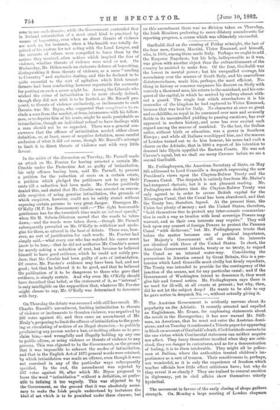Mr. Frelinghuysen, the American Secretary of State, on May 8th
addressed to Lord Granville a despatch expressing the new President's views upon the Clayton-Bulwer Treaty and the Panama Canal. The despatch is entirely free from Mr. Blaine's bad-tempered rhetoric, but it is not pleasant reading. Mr. Frelinghuysen declares that the Clayton-Bulwer Treaty was only agreed to in order to secure British capital for the Nicaragua Canal, that the Canal has been abandoned, and that the Treaty has, therefore, lapsed. At the present time, the Union has plenty of money ; and the United States, therefore,. "hold themselves free to protect any inter-oceanic communica- tion in such a way as treaties with local sovereign Powers may warrant, and as their own interests may require." They will look upon any concert of foreign Powers to protect the Panama Canal "with disfavour," but Mr. Frelinghuysen trusts that before the matter becomes one of practical importance, her Majesty's Government will see that its interests are identical with those of the United States. In short, the American Government intends, treaty or no treaty, to regard the Canal as an internal water-way. Considering the possessions in America owned by Great Britain, this is a pre- tension which Lord Granville must civilly but firmly repudiate, The Treaty was intended to provide for the contingency of the junction of the oceans, not for any particular canal ; and if the Government of Washington intend to denounce it, they must give fair and formal notice. Mr. Frelinghuysen says there is. no need for ill-will, at all events at present ; but why, then, did he not let the subject drop ? He wants to be able to say he gave notice in despatch No. —, without actually giving it.




































 Previous page
Previous page